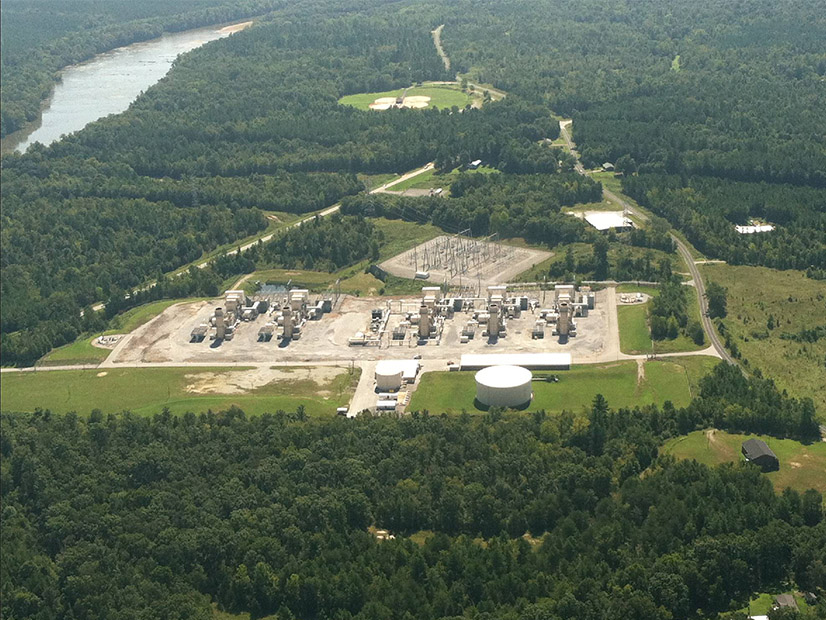
FERC approved penalties on Thursday totaling $147,000 against University Park Energy of Illinois and Broad River Energy of South Carolina, as part of a package of settlements concerning violations of NERC’s reliability standards filed in NERC’s monthly spreadsheet Notice of Penalty (NP23-11).
The commission indicated in a filing that it would not further review the settlements that the utilities reached with ReliabilityFirst and SERC Reliability, respectively, leaving the penalties intact. FERC also approved a settlement concerning an infringement of NERC’s Critical Infrastructure Protection (CIP) standards filed along with the SNOP on Jan. 31 (NP23-10); the utility and regional entity involved were not identified, in keeping with NERC and FERC’s policy on CIP violations.
Broad River Settles Over Communication Issues
SERC’s settlement with Broad River stems from violations of VAR-002-4 (Generator operation for maintaining network voltage schedules) and PRC-005-1b (Transmission and generation protection system maintenance and testing). The settlement carries a $115,000 penalty.
Broad River brought the VAR-002-4 violation to SERC’s attention via a self-report, though SERC noted that the utility submitted the report only “after receiving notice of an upcoming spot-check” and the RE thus did not consider the report a mitigating factor. Similarly, mitigating credit was denied for the report of the PRC-005-1b violation because Broad River “reported the violation through the self-certification process.”
According to the filling, SERC had planned the spot-check to begin Oct. 21, 2019, and asked Broad River ahead of time for proof of VAR-002-4 compliance between Aug. 1, 2015, and Oct. 18, 2019. The utility ran a complete voltage profile for the entire period, matching it against the generator voltage schedule provided by the transmission operator (TOP); requirement R2 of VAR-002-4 requires generator operators to maintain the TOP’s schedule or inform the TOP why it cannot be met.
Examining the voltage schedules, Broad River identified 419 events in which its generator facility “was outside of the voltage schedule for 30 minutes or longer.” Operators only notified the TOP about 57 of these excursions, a violation of the standard.
SERC determined that the violation began on Aug. 5, 2015 — the first time the utility experienced an excursion and failed to notify the TOP — and ended March 7, 2019, the last time such an event occurred. The RE attributed the violation’s cause to “inadequate communication between third-party plant and asset manager and senior management, and [between] plant management and employees responsible for compliance.”
The violation of PRC-005-1b — and its successor PRC-005-6 (Protection system, automatic reclosing, and sudden pressure relaying maintenance) — relates to requirement R2 of the earlier standard and R3 of the latter, which describe the minimum maintenance activities timelines for protection systems and the acceptable evidence for completion of the activities.
Broad River informed SERC on June 11, 2020, that it could not confirm it had completed all required testing under PRC-005-6. The utility said that while the previous operator of its generation facility had a schedule for performing the tests, Broad River did not have documentation that they actually had been done.
To assess the extent of the noncompliance, Broad River performed a complete walkdown of its facility and found 435 devices that were included under the standard’s requirements but for which it did not have proper evidence of testing. In some cases, the lack of supporting documents began as early as Dec. 27, 2012, the date it registered as the operator of the facility; as a result, SERC determined that the violation spanned the earlier standard as well.
To address the noncompliance, the utility tested all devices for which it had no records; the final test was completed on Nov. 5, 2021. SERC concluded that the cause of this violation — as with the VAR-002-4 infringement — was organizational silos that prevented adequate communication between parties responsible for compliance.
The RE said it aggravated the penalty for both infringements based on “the number of instances and long duration for the violations [which] indicated the prior management’s ignorance of the violations.” However, it did award mitigating credit for cooperation and timely responses, and because Broad River agreed to settle, “thereby avoiding a hearing on this matter.”
RF Faults Utility for Maintenance Schedule Slips
University Park’s $32,000 settlement with ReliabilityFirst involved PRC-005-2 (i) (Protection system maintenance). Requirement R3 of the standard establishes the schedule by which transmission owners, generation owners, and distribution providers must maintain their protection system components.
The utility informed ReliabilityFirst on May 15, 2020, that it had discovered, as part of a third-party review of its NERC compliance program, that “not all components were being maintained/tested, or maintenance and testing activities were not being documented, as required.” The problem encompassed multiple classes of equipment at its generator facility.
University Park attested that the violation began on Oct. 1, 2015, when the facility was required to comply with the standard, and continued until May 21, 2021, when it completed its mitigating activities. These included developing a preventative maintenance work plan to “identify the maintenance required and its frequency for all applicable equipment.” The utility also reviewed the violation with all applicable staff members.
The RE said it awarded mitigating credit to the utility for coming forward voluntarily because it “seeks to encourage this type of self-reporting.” However, it also noted previous compliance issues with PRC-005-1, saying this should serve as an aggravating factor in the penalty because the utility “failed to sustain the mitigating actions … in response to those prior issues.”



